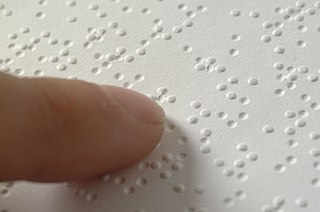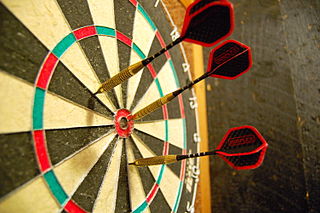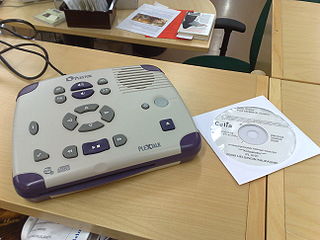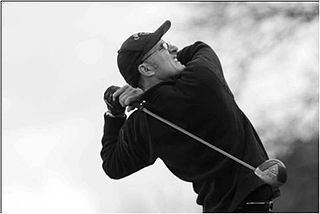
Braille is a tactile writing system used by people who are visually impaired, including people who are blind, deafblind or who have low vision. It can be read either on embossed paper or by using refreshable braille displays that connect to computers and smartphone devices. Braille can be written using a slate and stylus, a braille writer, an electronic braille notetaker or with the use of a computer connected to a braille embosser.
Paralympic football consists of adaptations of the sport of association football for athletes with a physical disability. These sports are typically played using International Federation of Association Football (FIFA) rules, with modifications to the field of play, equipment, numbers of players, and other rules as required to make the game suitable for the athletes
The Royal National Institute of Blind People (RNIB) is a UK charity offering information, support and advice to almost two million people in the UK with sight loss.

Darts or dart-throwing is a competitive sport in which two or more players bare-handedly throw small sharp-pointed missiles known as darts at a round target known as a dartboard.
An audio game is an electronic game played on a device such as a personal computer. It is similar to a video game save that there is audible and tactile feedback but not visual.
Audio description, also referred to as a video description, described video, or more precisely visual description, is a form of narration used to provide information surrounding key visual elements in a media work for the benefit of blind and visually impaired consumers. These narrations are typically placed during natural pauses in the audio, and sometimes during dialogue if deemed necessary. Occasionally when a film briefly has subtitled dialogue for a character speaking a different language in the film such as in the 1977 film, Star Wars: A New Hope with Greedo's confrontation with Han Solo, the narrator will read out the dialogue in character.
This is a glossary of terminology used in the game of darts. Where words in a sentence are also defined elsewhere in this article, they appear in italics.
Visual impairment, also known as vision impairment, is a medical definition primarily measured based on an individual's better eye visual acuity; in the absence of treatment such as correctable eyewear, assistive devices, and medical treatment– visual impairment may cause the individual difficulties with normal daily tasks including reading and walking. Low vision is a functional definition of visual impairment that is chronic, uncorrectable with treatment or correctable lenses, and impacts daily living. As such low vision can be used as a disability metric and varies based on an individual's experience, environmental demands, accommodations, and access to services. The American Academy of Ophthalmology defines visual impairment as the best-corrected visual acuity of less than 20/40 in the better eye, and the World Health Organization defines it as a presenting acuity of less than 6/12 in the better eye. The term blindness is used for complete or nearly complete vision loss. In addition to the various permanent conditions, fleeting temporary vision impairment, amaurosis fugax, may occur, and may indicate serious medical problems. The abbreviation VIP is sometimes used for Visually Impaired Person, Persons or People.
Blind cricket is a version of the sport of cricket adapted for blind and partially sighted players. It has been governed by the World Blind Cricket Council (WBCC) since 1996. So far, five Blind World Cups have been held: New Delhi, India (1998); Chennai, India (2002); Islamabad, Pakistan (2006), and India (2018). In 2012, the first Blind World Cup T20 was held in Bangalore, India. Blind cricket relies on common use of the 'sweep shot', in order to provide maximum chance of the bat hitting the ball.

Digital accessible information system (DAISY) is a technical standard for digital audiobooks, periodicals, and computerized text. DAISY is designed to be a complete audio substitute for print material and is specifically designed for use by people with "print disabilities", including blindness, impaired vision, and dyslexia. Based on the MP3 and XML formats, the DAISY format has advanced features in addition to those of a traditional audio book. Users can search, place bookmarks, precisely navigate line by line, and regulate the speaking speed without distortion. DAISY also provides aurally accessible tables, references, and additional information. As a result, DAISY allows visually impaired listeners to navigate something as complex as an encyclopedia or textbook, otherwise impossible using conventional audio recordings.
Within the field of human–computer interaction, game accessibility refers to the accessibility of video games. More broadly, game accessibility refers to the accessibility of all gaming products, including video games, tabletop RPGs, board games, and related products. Video game accessibility is considered a sub-field of computer accessibility, which studies how software and computers can be made accessible to users with various types of impairments.

The Paralympic sports comprise all the sports contested in the Summer and Winter Paralympic Games. As of 2020, the Summer Paralympics included 22 sports and 539 medal events, and the Winter Paralympics include 5 sports and disciplines and about 80 events. The number and kinds of events may change from one Paralympic Games to another.
Showdown is a sport for the blind and visually impaired which could be described as the blind community's answer to air hockey, or table tennis. It is growing very quickly around the world. It is also played by sighted players, but they are not allowed to participate in the International Blind Sports Federation (IBSA) tournaments. Showdown is widely spread in Europe, but it's also played in: Africa, Asia, North America, and South America. After the success of Showdown at the 1996 Atlanta Paralympics, representatives from more than thirty countries contacted the International Blind Sports Federation Showdown Subcommittee. They wanted information about equipment, blueprints, and rules so they could play this game in their country. Currently, the IBSA Showdown Sub-committee is encouraging regional and national Showdown Tournaments in an effort to have international championships which, hopefully, will lead to sanctioning by the Paralympics.
Blind artists are people who are physically unable to see normally, yet work in the visual arts. This seeming contradiction is overcome when one understands that only around 10% of all people with blindness can see absolutely nothing at all. As such most blind people can in fact perceive some level of light and form, and it is by applying this limited vision that many blind artists create intelligible art. Also, a blind person may once have been fully sighted and yet simply lost part of their vision through injury or illness. Blind artists are able to offer insight into the study of blindness and the ways in which art can be perceived by the blind, in order to better improve art education for the visually impaired.
A sighted guide is a person who guides a person with blindness or vision impairment.

Disability in the arts is an aspect within various arts disciplines of inclusive practices involving disability. It manifests itself in the output and mission of some stage and modern dance performing-arts companies, and as the subject matter of individual works of art, such as the work of specific painters and those who draw.
Warwickshire Vision Support is a registered charity providing rehabilitation services for adults with visual impairments to enable them to live independently. Services are provided by Warwickshire Vision Support's rehabilitation team at offices in Warwick. In 2014, Warwickshire Association for the Blind changed its operating name to Warwickshire Vision Support. In 2020, the organization received the prestigious Queen's Award for Voluntary Service.

B2 is a medical based Paralympic classification for blind sport. Competitors in this classification have vision that falls between the B1 and B3 classes. The International Blind Sports Federation (IBSA) defines this classification as "visual acuity ranging from LogMAR 1.50 to 2.60 (inclusive) and/or visual field constricted to a diameter of less than 10 degrees." It is used by a number of blind sports including para-alpine skiing, para-Nordic skiing, blind cricket, blind golf, five-a-side football, goalball and judo. Some sports, including adaptive rowing, athletics and swimming, have equivalents to this class.

B3 is a medical based Paralympic classification for blind sport. Competitors in this classification have partial sight, with visual acuity from 2/60 to 6/60. It is used by a number of blind sports including para-alpine skiing, para-Nordic skiing, blind cricket, blind golf, five-a-side football, goalball and judo. Some other sports, including adaptive rowing, athletics and swimming, have equivalents to this class.

Disability golf classification is used for deaf golf, blind golf, amputee golf, golf for the mentally disabled, paraplegic golf and other forms of golf involving people with disabilities.







